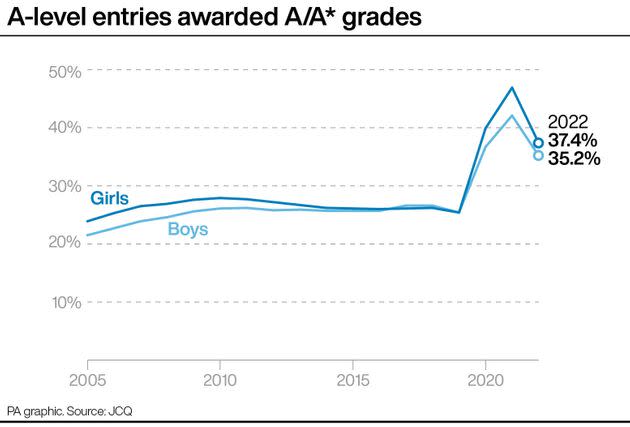Why Students Received Lower A-Level Grades This Year Compared To 2020 And 2021

2022's exam results were significantly lower grades compared to the previous two years (Photo: Richard Bailey via Getty Images)
This year’s A-level results were significantly lower than they have been in previous years – but that’s not necessarily a bad thing (students, don’t panic!).
This year’s results, summarised
Around 36.4% of A-levels were A* and A, compared to 2021′s 44.8%.
But, in 2019 just 25.4% of grades were A* and A – meaning this year’s results hit a middle ground between the two.
The overall pass rate for England, Wales and Northern Ireland was at 98.4% – again, a stat which is in between the low 2019 levels and high 2021 levels.
T-levels, the new vocational qualification in England, also saw a pass rate of 92.2% among the 1,029 students.

A-level entries awarded A/A* grades (Photo: Press Association Images)
What’s changed?
The pandemic had a huge impact on the way exams were conducted.
This year was the first time since 2019 that A-level grades were based on exams, rather than teacher-assessed grades, because it was deemed safe for large gatherings (like those in exam halls) to go ahead.
But, the marking system for 2022 has been altered so grades are a “midway point” between 2019 and 2021.
England’s exam watchdog said it was looking to bring grades back to pre-pandemic levels, but wanted to acknowledge “that we are in a pandemic recovery period and students’ education has been disrupted”.
Northern Ireland and Wales’ results are expected to follow suit, with top grades falling between 2019 and 2021 levels.
Students in Scotland have already received their exam results on August 9, and the grades fell there too, as the pass rate dropped to 78.9% from 87.3% in 2021.
So, how close are we to returning to pre-pandemic exams?
The grade inflation seen throughout the pandemic was only partially tackled this year. It is not completely down to 2019 levels just yet, where only a quarter of grades were A* or A.
Still, pupils have been advised not to compare their grades with those of the last two years because the grade boundaries are so different, and so are the assessments – meaning it has much less to do with students’ individual performance.
Exam boards also wanted to be more lenient to students because they have still been under pressure due to Covid, with many of this cohort not sitting their GCSE exams due to social distancing measures in place at the time. So, some exam boards provided advanced information to teachers about various topics.
What does this mean for university admissions?
Despite lower numbers of A* and A grades, those who want to go to university have been reassured that they will still be able to access university places.
The second highest number of students on record were accepted into university or college today – 425,830. Two-thirds of pupils also got their first-choice.
The record was made back in 2021, when there was a huge influx of students who got into university based on their teacher-assessed grades.
Compared to last year, 19% more 18-year-olds were accepted through their first or insurance choice compared to 2019.
But it’s not just grades that need to be considered – with the cost of living soaring, more people will be reconsidering whether the university fees and living costs are affordable for them this year.

Students accepted on UK degree courses (Photo: PA GraphicsPress Association Images)
This article originally appeared on HuffPost UK and has been updated.

 Yahoo Movies
Yahoo Movies 